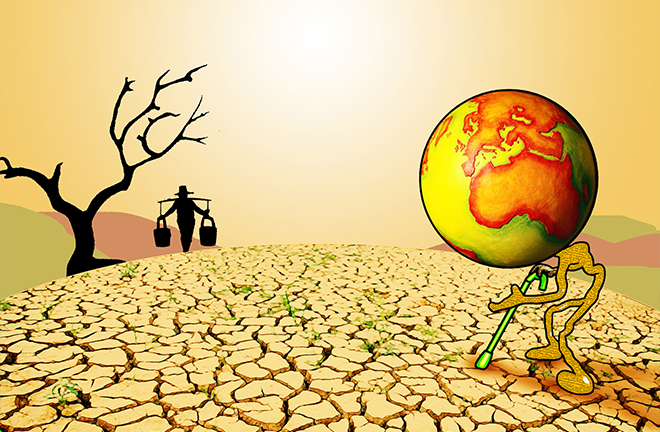Tackling three types of existential crises

An illustration about the importance of avoiding ecological pollution and keeping harmony between man and nature Photo: Chen Yuliang/CNS
Humans now face three major types of complex relationships. Entangled with each other, they constitute three major crises which now threaten human existence.
Man-nature crisis
The relationship between man and nature—this is humanity’s primary struggle in early stages of civilization. Since the Industrial Revolution, human living environments have been deteriorating, with the appearance of the climate crisis, the environmental pollution crisis, and a biodiversity crisis as a result. These crises stem from people’s pursuit of higher efficiency and the desire to possess more resources. The ramifications of each step taken with this consuming motivation, accumulated throughout time and space, still permeate today’s world.
This kind of crisis is manifested in the interdependence between man and nature. In the course of human development—from the agricultural era to the industrial era and then to the post-industrial times—social trends occurred one after another, with abrupt changes and disintegration in the process. As a consequence, the original balance of the ecological system was broken. This will mean new forms of interdependence between man and nature, which will benefit some groups of people. At the same time, other unknown dysfunctional relationships will arise, and the aftermath of these will affect other groups and future generations, while the beneficiaries may be able to side-step the possibly difficult situations. The whole ecosystem will then become increasingly unbearable due to growing internal dysfunctions, as result of which, new imbalances are created. As humans zigzag along, in a way that is full of divergence and disintegration, eventually all of humanity will be affected, including those who caused the imbalance.
The still raging COVID-19 pandemic now signals a warning: human knowledge and deeds are limited, and man should have awe and respect for nature.
Man-artificial nature crisis
With the development of science and technology, the relationship between man and “artificial nature,” or as Marx is called it the humanized nature, which denotes nature of anthropological significance, is becoming more and more important. The crisis posed by this relationship is just emerging, and is mainly manifested in a latent way with the application of Artificial Intelligence (AI) and Virtual Reality (VR), though there exists controversy as to whether the related phenomenon can be defined as a crisis. At the initial stage, when machines and other products with an artificial nature emerged, people looked down on them. Today, as machines are on their way to substituting or even surpassing humans in many areas, the uncertainties brought by this crisis and its scope, varieties, and frequency are all increasing.
Crisis caused by humans themselves
The third kind of crisis comes from the internal contradictions of human themselves, which can be divided into the contradictions between oneself and others, and that between one and the self.
The former is mainly seen as a conflict between countries—for example, disputes over carbon emission quotas distributed to each country designed to contain climate change. As a matter of strategic interaction between countries, with a zero-sum mentality, this concerns different countries’ historical responsibilities as they weigh their own benefits at the present time and in the short-term future. In addition, economic instability, wealth gaps and conflicts between civilizations will affect the resolutions made between countries.
The latter is the struggle within human society itself as an entirety. Being curious and having a strong desire to control the world of endless boundaries—this is the basic instinct of humans. But as Freud believed, human instinct is always slightly stronger than people’s abilities to control their instincts, which has been proven by the arc of human development over the years. This may be what causes the contradiction within humanity as a whole.
Lyu Naiji is a professor from the Department of Philosophy and Science at Southeast University.
Edited by BAI LE
